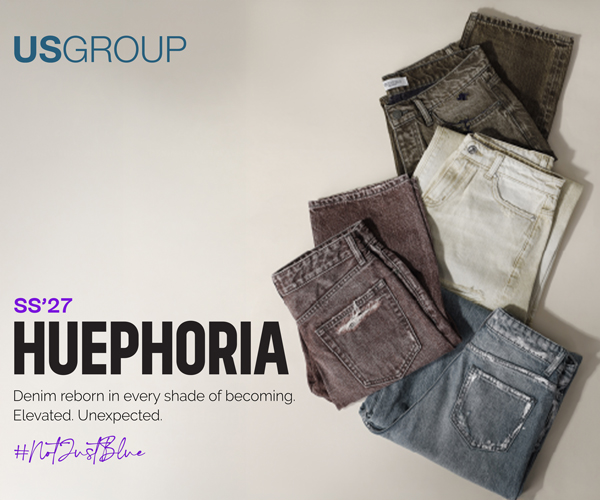Imogen Nulty: Denim is key to longevity so we’ve focused on the perfect fabrics

The pandemic has taught us we can manage with less, says the denim design manager at Scotch & Soda. The Dutch retailer is investing in its higher-volume items, as these have the biggest impact, and is in the process of reworking its denim essentials to make all fabrics and washes ‘responsible’.
What has been the biggest change for your way of working since the pandemic started?
At Scotch & Soda, we have a very unique, hands-on and face-to-face way of designing and communicating. Not a lot of computer sketches and digital are involved in the process. Traditionally, we were meeting frequently in person with suppliers to discuss developments, which involved a good deal of travel. We have had to find new ways during the pandemic to make these connections without losing our passion and creative spirit.
More use of technology has been unavoidable, as well as lots more emails and video calls, but it has also made us more efficient. I think it has also given us more freedom in some ways to keep a close team connection, more time to be considerate about the product and the possibilities… and it feels that this is coming out in the product we are creating. Although at the moment we can’t interact in person as much as we did in pre-covid times, I feel very close to my colleagues and feel like we are in sync more now than ever.
What will consumers be looking for in the future, how will this affect design?
Customers are certainly becoming more informed about what their clothes are made of and where they come from. Consumers want more transparency, from the food they eat to the garments they wear.
On our end, for the last three or so years, we have focused on selecting more sustainable denim fabrics, trimmings and washes, something that we intend to increase more for the future. I also think we will focus more on design so that it allows and encourages consumers to recycle or reuse our products.
There is a shift towards buying for longevity. The pandemic has taught us that we can manage with less. People would rather have a more compact wardrobe, where most items are investment pieces, something that really speaks to them and that makes them smile.
This shift will affect how we design in terms of making less, and producing it better, giving each style more attention. We increasingly focus on multifunctional products that last through changes in seasons. Garments need to be unique and special, rich in attention to detail, with so much love in them that you can’t possibly throw them away!
As a product that you can wear any day and any time, denim is key to this storyline. We have been putting a lot of focus on the perfect base fabrics and also on the perfect fit. We want our jeans to feel like your all-time favourite jeans! But we also want to keep bringing those hidden surprises, the added elements such as a humorous label inside the fly, or a colourful back patch.
What’s driving your sustainability investments and how do you decide where to invest?
As I mentioned, we are very focused on buying for longevity.
Another prominent investment is to gradually build the percentage of sustainable fabrics in the collection every season. In particular, we realised that it was important to invest sustainably in our higher volume items, as these have the biggest impact. So we are currently in the process of reworking our denim essentials programme to make all fabrics and washes responsible.
We have also been focused on the details, as they all count: using FSC paper hangtags, recycled polyester labelling and introducing recycled leather and apple skin patches. We are trying to be better each day, each week and the small changes will total up to a bigger impact each season.
Water preservation is also really important to us. We have been busy measuring and setting targets for water use and water saving in our denim products. We are using Jeanologia’s EIM certification to help us measure where we are, and to help us set goals of where we need to be for the future.
Do you wish consumers knew more about supply chains, and if so, how could they be more educated?
I do think some consumers are starting to demand more transparency about supply chains specifically, which is a good thing. For them it is not enough to know a certain fabric is organic for example, they also want to be aware of how it is produced. Transparency is also important for ourselves and our processes in order to understand where we can do better each day in terms of labour conditions, environmental harm, etc.
It would be great if all consumers did know more about the complexity of sourcing, development and production process. And it is our duty as brands to communicate what we are doing from a responsibility standpoint, allowing consumers to make their own informed choices.
Some examples of our efforts include launching a clear labelling system for our “Scotch Cares” products and detailed stories about responsible fabric choices in the pocket bag prints of our jeans later this year. We also publish a full list of tier one and two suppliers that we are working with on our website and we aim to increase transparency across the full supply chain. All our tier one and tier two suppliers have signed and agreed on our code of conduct and are already, or in the process of getting, [supply chain monitoring platform] Amfori BSCI compliant in the short term.
We value immensely the relationships that we have with our suppliers. They are part of the bigger Scotch family and some partnerships have indeed been going strong for over 20 years.
In terms of fibres and materials, what would you like to see happen in the next five years?
We challenge ourselves to improve our practices, sourcing better materials and reducing our environmental impact through monitoring and lowering our water, chemical and energy use. In 2020, during the annual Amsterdam Denim Days event, we joined several other brands and suppliers in The Denim Deal, which is focused on making the post-consumer recycling of textiles the new industry standard. As a group, we have agreed to working as quickly as possible to a standard of 5% recycled textiles in all denim garments. We have also collectively pledged to make three million denim garments containing at least 20% recycled textiles over the next three years.
Other goals are to find alternatives to conventional cotton, which has a significant impact on the environment. We are committed to replacing all conventional cotton in our collections with better alternatives such as recycled, organic or BCI-certified cotton by 2025. All our organic cotton is certified by third-party organisations. We are members of GOTS, which is the leading global standard for organic textile fibres, including compliance with specific environmental and social criteria across the supply chain.
For the current summer 2021 season, 41% of all styles across all lines meet our responsible materials standard of 20% use of responsible material by item. Our aim will be to increase this so that 70% of styles to be made by early 2024 will meet such standards. From the summer 2022 collection onwards, Scotch & Soda will be increasing the responsible standard of materials use to a minimum of 50% of these materials. These are certified fibres that are organic, recycled, regenerative or renewable from a biological or technical source, such as organic cotton, recycled polyester or Econyl, except in the use of recycled cotton, in which our threshold is 20% to ensure that we maintain the durability and quality of the fabric as the fibres of recycled cotton are shorter.
In terms of innovation in fibres and materials, so much has happened in the last five years, I look forward to the next five!
What work are you proudest of? What interests you the most?
I feel proud every time someone walks past in the street and I spot the Scotch & Soda signature XXX stitched on their back pocket and think “ooohh that’s one of ours!” That never gets old for me…The designs I’m most proud of are the ones that we create as a team, where it's been collaborative, and each person has brought their unique knowledge to the table. We work really closely with our buyers, merchandisers, graphic and trim designers as well as with the other design teams, and it's lovely when you really feel like something has been a team effort. You get more unexpected results that way.
I also love the pieces that combine innovation in fit, fabric and design. Later this year we will launch a new loose fit in denim collection made in 100% recycled cotton from the Bossa mill. The fit is really 90s inspired and baggy, which I love. I’ve been dreaming for a while of a fully recycled fabric that looks really cool, and now it's here!
Denim still continues to interest me the most, and keeps me inspired, perhaps because it is timeless, or because it is a fabric that is alive, with endless possibilities. With every season there is something new to celebrate and explore, there is never a dull moment!
Imogen Nulty, denim design manager at Scotch & Soda, is from Warrington, England. She studied BA fashion design at Manchester Metropolitan University, focusing on menswear and print, and has been in Amsterdam, working at Scotch and Soda, for 10 years. She is responsible for the design of the denim collection including ladies, men’s and kids’ collections. She previously worked for Dutch brand Kuyichi and at Levi’s Europe.













